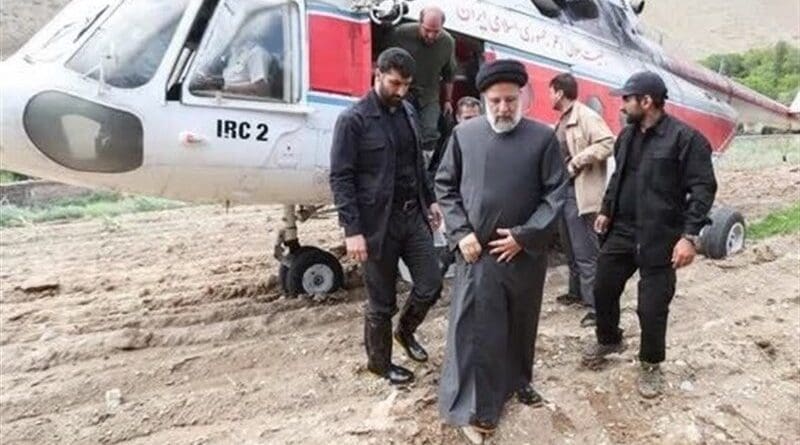What Comes Next For Iran In Wake Of Raisi’s Death? – OpEd
By Dave Patterson
On a foggy mountaintop in northwestern Iran, a helicopter carrying Iran’s 63-year-old President Ebrahim Raisi, Foreign Minister Hossein Amir Abdollahian, and six others, including three crew, crashed on May 19, killing all on board. The leadership vacuum in Iran will probably not linger because Raisi, though influential, mainly just carried out the wishes of the supreme leader, Ali Khamenei, 85. As a hardline cleric, Raisi was known for his brutal suppression of dissent – and there are no signs that substantial change will follow in the wake of his demise.
Iran Best By Tech Issues
Raisi had been at the forefront of supporting Iran’s attacks on US facilities and the recent missile and drone barrage on Israel. Details of the helicopter crash on Sunday are sparse. Still, according to The New York Times, “They were traveling from Iran’s border with Azerbaijan after inaugurating a dam project when their helicopter went down in a mountainous area near the city of Jolfa.” An Iranian news service claimed the fatal accident was the result of “technical failure.”
The conclusion that the cause of the crash was failed tech came quickly. The helicopter was a US-produced Bell 212, a civilian variant of the twin-engine “Huey” flown by the Americans in Vietnam, supplied to Iran before 1979. Furthermore, “After the crash, experts pointed out that the more than 40-year-old Bell 212 was built to fly in visual flight conditions, meaning that the pilot had to rely solely on their ability to observe the terrain from their seat,” Euronews observed. Combine poor visibility with an aircraft not designed to fly in such conditions, pilots not known for aviation skills, and mountainous terrain, and catastrophic incidents become more likely.
A former Iranian official opined that US sanctions prohibiting the provision of spare parts for American-made aircraft reduced routine and necessary maintenance, hence the technical failure explanation. But it’s not like the Tehran government doesn’t have the money to buy the latest helicopter from Russia or China.
Many considered the late Iranian president to be the successor to Ayatollah Khamenei. Raisi’s death will put pressure on the ruling mullahs to come up with a replacement. Khamenei has declared five days of official mourning, and there will be 50 days in which the process of electing a new president will take place. In the meantime, Iran’s vice president, Mohammad Mokhber, will serve as interim president. It is not likely there will be a softening of Tehran’s hardline stance toward the West.
Nor will many Iranian people grieve Raisi’s passing. In 2023, Raisi was in charge during the street protest throughout Iran over the murder of 22-year-old Mahsa Amini for not complying with the hijab rules. “The rallies came to an end in mid-2023 after some 500 people were killed when security forces moved in to break up the protests, according to foreign human rights organizations. Seven people were executed for their roles in the unrest,” Aljazeera reported.
The Israelis were not the only ones with a “don’t look at us” response to Raisi’s demise. Sen. Chuck Schumer (D-NY) quickly made a televised statement to ensure his liberal constituency and the Iranians that the crash was an accident and there was no evidence of “foul play.” The relationship between the Biden administration and Iran would certainly have been tarnished by a suspicion that the United States had knocked off one of its most aggressive mortal enemies.
No Change in Tehran’s Bad Behavior
According to Reuters, an Iranian shopkeeper, Reza, 47, who declined to give his last name for fear of retribution, said, “Who cares? One hardliner dies, another takes over, and our misery continues. We’re too busy with economic and social issues to worry about such news.” Iranian-backed Houthi terrorists will still be firing missiles and launching drones at commercial vessels in the Red Sea. Iran will still be supporting Hezbollah’s attacks on Israel. Iran will remain the number one exporter of terror around the globe, supporting proxies in Iraq and Syria bent on attacking US outposts and military bases in the region. Middle East tensions will still be high. And the Biden administration will still be at a loss as to what to do about any of it.
The views expressed are those of the author and not of any other affiliate.
- About the author: National Security Correspondent at LibertyNation.Com. Dave is a retired U.S. Air Force Pilot with over 180 combat missions in Vietnam. He is the former Principal Deputy Under Secretary of Defense, Comptroller and has served in executive positions in the private sector aerospace and defense industry. In addition to Liberty Nation, Dave’s articles have appeared in The Federalist and DefenseOne.com.
- Source: This article was published by Liberty Nation

